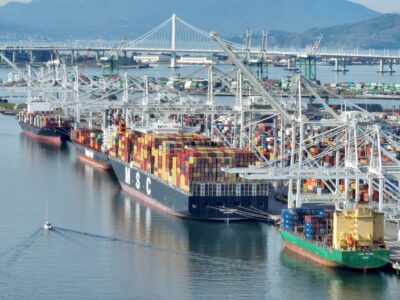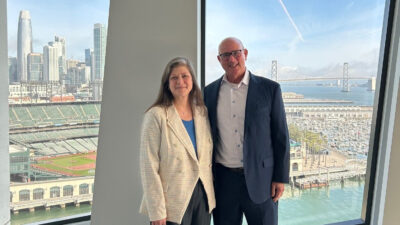Delivering Results for the Bay Area and Our Members
We’re going to need a bigger Flash.
That’s what it feels like as we take stock of the incredible record of results and accomplishments the Bay Area Council delivered this year for the region and state, particularly across our lead policy priorities of crime and public safety, housing and homelessness, climate resilience and improved transportation. Here are just a few highlights from an extremely productive year, when we also welcomed new Board Chair Kristina Lawson, Managing Partner for Hanson Bridgett, and thanked Kausik Rajgopal, Executive Vice President of Strategy, Corporate Development and Partnerships for PayPal, for his two years of leadership.
We won major and unprecedented legislative victories, including passing five significant housing reform bills in a year many pundits thought nothing would get done on housing. Two, in particular, stand out. Legislation (AB 1633) the Council sponsored strengthens penalties on local jurisdictions that abuse the California Environmental Quality Act (CEQA) to delay new projects. Another bill (AB 1033) extends our pioneering leadership on dramatically increasing accessory dwelling units (ADUs) across the state by enabling cities to authorize allowing homeowners to sell ADUs as condos.
Our advocacy in Sacramento was pivotal in securing Gov. Newsom’s veto on several awful bills, including legislation to decriminalize fare evasion on BART, another bill to extend unemployment benefits to striking workers and a third bill that would have set California back in the race for autonomous vehicle supremacy. Working with the New California Coalition the Council created with the Los Angeles County Business Federation, we helped Gov. Newsom win passage of landmark legislation to streamline and speed up a range of critical clean energy, water and other climate resilience infrastructure projects.
The Council played an instrumental role in winning $5.1 billion in the state budget to avoid our key transit systems plunging over a fiscal cliff, and we almost single-handedly defeated (at least, temporarily) an untimely proposal to increase bridge tolls that would have punished many lower-income commuters. We continue to advocate for more accountability and stronger coordination among our balkanized transit agencies, and California Transportation Sec. Toks Omishikan this month appointed Council CEO Jim Wunderman to serve on a state task force charged with doing just that (see item below).
With crime, safety and cleanliness cited by a vast majority of commuters as the main reasons for not riding BART, the Council continued an aggressive campaign calling for greater urgency and speed in addressing the problem. In response, BART launched regular police patrols on trains and in stations and increased recruiting for more police officers and ambassadors. And BART has now gone all-in on public messaging touting its focus on safety and cleanliness. The Council also built the foundation for a regional recruitment campaign to help police departments struggling with officer shortages.
Our stature on the global front reached new heights this year. We partnered on the application to bring the historic APEC Leaders Summit to San Francisco in November, helped raise millions of dollars to host the gathering and, with generous support from Sutter Health, convened a series of APEC meetings and receptions on our floating headquarters, The Klamath, that featured dozens of high-level ministers, foreign dignitaries and business leaders. In just over a year since opening, The Klamath has become a recognized hub for convening top foreign business and government leaders, with almost weekly delegations.
In July, the Council led a delegation to Australia with member company United Airlines focused on climate resilience that preceded the signing of a formal partnership between California and the Aussies on the very same topic. And in China, the Council co-hosted a reception for Gov. Newsom during his visit and we once again represented California at the massive China International Import Expo.
Thank you to our more than 325 member organizations for the generous support they provide to make this work possible. And to the Council staff and many partners with whom we work. Despite the many challenges our region continues to face, the Bay Area Council remains unwaveringly optimistic about the future of this great region we call home.





